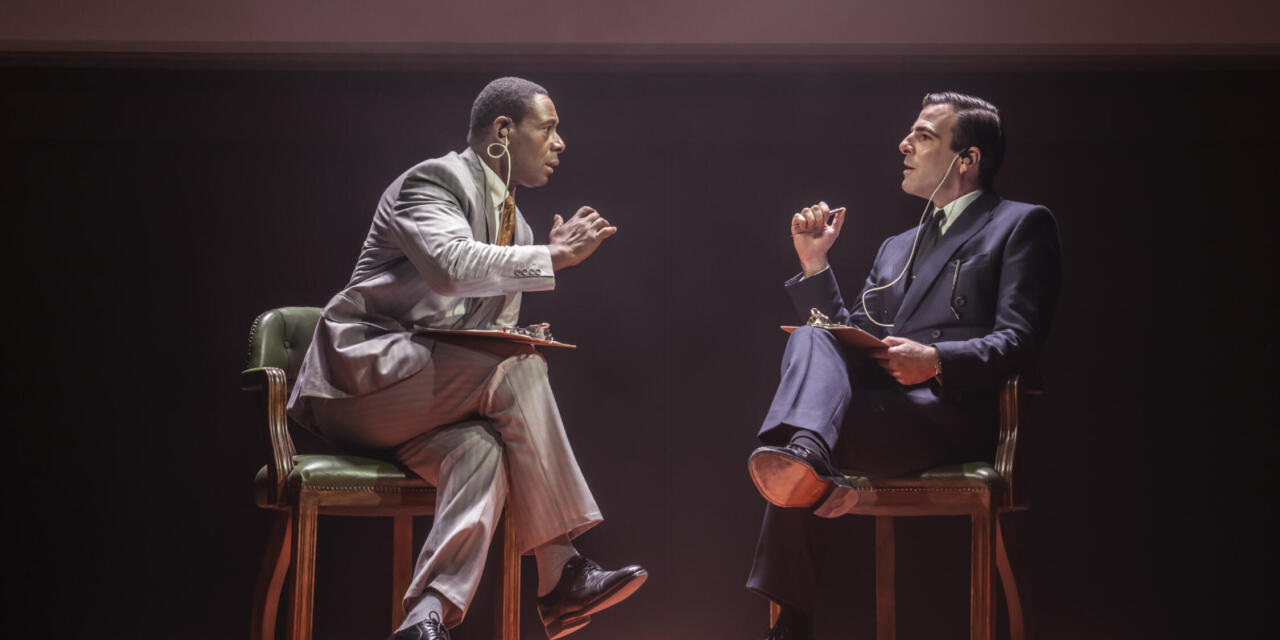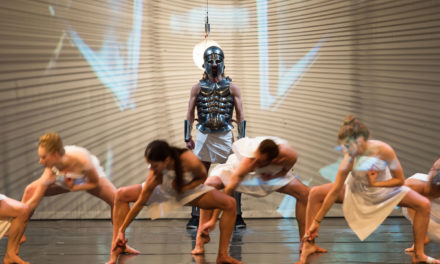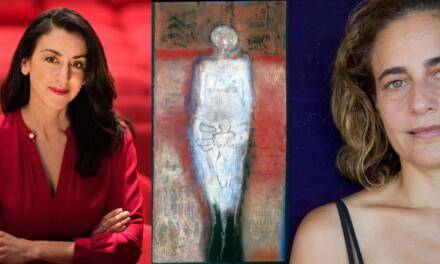TV is a strange medium, but James Graham is no stranger to its toxic charm. London audiences have recently witnessed the British playwright’s musical adaptation of the life of Tammy Faye, the televangelist whose beguiling rise and fall were charted at the Almeida Theatre. Elsewhere in London, the Noël Coward Theatre now hosts the West End revival of Graham’s Best of Enemies, originally staged at the Young Vic in December 2021. Like Tammy Faye, Best of Enemies turns to TV culture in the twentieth-century US as civic space that can both galvanize and undo individual careers and collective movements.
Based on Robert Gordon and Morgan Neville’s 2015 documentary of the same name, Graham’s juicy but light-on-its-feet drama takes a hard look at a series of seven televised debates between the conservative commentator William F. Buckley Jr. and the liberal author Gore Vidal. Brought together by a fledgling ABC News intent on increasing its ratings, these two “controversialists” locked their horns in August 1968 over matters that cut to the very soul of America. At a time of tremendous social and political turbulence for the country, these debates were scheduled to simmer and explode against the backdrop of Republican and Democratic national conventions before the 1968 presidential election.
Jeremy Herrin’s efficiently winsome production presents this historical material in ways that engage without diluting the significance of the issues at stake. A top-notch cast, helmed by David Harewood and Zachary Quinto (both excellent), infuse depth and vigor into characters whose political alliances are, importantly, not the only thing that gives them distinctive flavor. Harewood’s Buckley is an easily frustrated, flustered man who finds his decorum increasingly tested in the face of his opponent’s quips. Quinto’s Vidal slyly relies on his calm charisma, as well as his arch eloquence, throughout his intellectual combat with Buckley. The chemistry between the two is well-adjusted: their not-so-veiled hostility feeds on complex temperaments that, at times, curiously resemble each other.
Graham deftly interweaves this central antagonism with as many contextual details—and figures—from the period as possible. Among those we encounter in such supporting capacity are James Baldwin, Aretha Franklin, Andy Warhol, and Tariq Ali. Baldwin, especially, makes for a memorable aspect of the proceedings, both with the characteristic force of his commentary and through Syrus Lowe’s impressive take on the part. John Hodgkinson brings tremulous warmth to Howard K. Smith—the host of the debates—and Kevin McMonagle presents a similarly sympathetic Elmer Lower, the president of ABC at the time. Clare Foster (as Buckley’s wife Patricia) and Tom Godwin (as the senior editor of Buckley’s National Review) impress as the conservative figure’s playful collaborators.
These eclectic characters come together in intriguing constellations on Bunny Christie’s two-storey set that morphs, with agility, between a TV studio and a range of other settings. Max Spielbichler’s video design, aided by Tom Gibbons’ evocative sounds and Jack Knowles’ jolting lights, provides a rich sampling of historical and simulated footage. These reflections of the period’s visual vocabulary powerfully immerse us in the play’s setting, even as the questions that emerge over the course of its two hours look forward to the present-day political climate, both in the US and beyond.
At times, Graham’s audacious drama may feel slightly schematic in its progression and in its seeming endeavor to offer a crash course in American history of the 1960s. Yet its central conceit, cultivated with both care and gusto, is more than compelling enough to make Best of Enemies a sturdy piece of contemporary political theatre. In asking whether reasoned debate might in fact be an oxymoron, it not only approaches our current moment of political polarization from an unlikely angle, but takes us back, ever so gently, to the very roots of the dramatic form itself.
This post was written by the author in their personal capacity.The opinions expressed in this article are the author’s own and do not reflect the view of The Theatre Times, their staff or collaborators.
This post was written by Mert Dilek.
The views expressed here belong to the author and do not necessarily reflect our views and opinions.


















